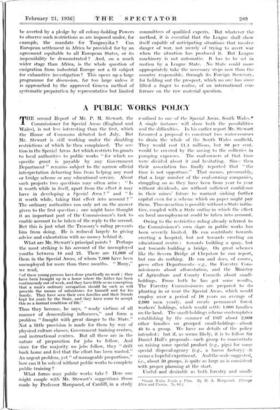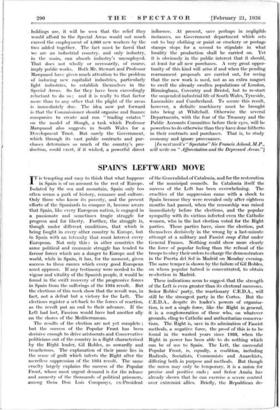A PUBLIC WORKS POLICY
THE second Report of Mr. P. M. Stewart, the Commissioner for Special Areas (England and Wales), is not less interesting than the first, which the Rouse of Commons debated last July. But Mr. Stewart is still working under the disabling restrictions of which he then complained. The sec- tion in the Special Areas Act which restricts his grants to local authorities to public works " for which no specific grant is payable by any Government Department " remains subject to the narrow official interpretation debarring him from helping any road or bridge scheme or any educational service. ' About such projects two questions may often arise : " Is it worth while in itself, apart from the effect it may have in developing a .Fecial Area ? " and " Is it worth while, taking that effect into account ? " The ordinary authorities can only act on the answer given to the first question ; one might have thought it an important part of the Commissioner's task to enable account to be taken of the reply to the second. But this is just what the Treasury's ruling prevents him from doing. He is reduced largely to giving advice and exhortation with no money behind it.
What. are Mr. Stewart's principal points ? Perhaps the most striking is his account of the unemployed youths between 18 and 21. There are 11,000 of them in the Special Areas, of whom 7,000 have been unemployed for more than three months. "Many," we read,' ".of these young persons have done practically no work ; they have been brought up in a home where the father has been continuously out of work, and they have little or no conception that a man's ordinary -occupation should. be such as will provide the means of subsistence for himself and for his family. They have seen their own families and their friends kept for years by the State, and they have come to accept this as a normal condition of life."
Thus they become, he says, " ready victims of all manner of demoralising influences," and form a problem ":fraught with great danger to the State." Not a little provision is made for them by way of physical culture classes; Government training centres, and instructional centres. But all these arc in the nature of preparation for- jobs to follow. Mid since for the majority no jobs follow, they " drift back home and feel that the effort has been wasted." An urgent problem, yet " of manageable proportions," how can it be solved without public Works to complete public training ?
What forMs- may public works take ? Here one might couple with Mr. -Stewart's suggestions those made by Professor Marquand; Cardiff,' in a study confined to one of the Special Areas, South Wales.* A single instance will shot• both the possibilities and the difficulties. In his earlier report Mr. Stewart favoured a proposal to • construct two water-courses to drain the whole of the South Wales coalfield. They would cost £1.4 millions, but 80 per cent. would be covered by the saving to the collieries in pumping expenses. The coal-owners at that time were divided about it and hesitating. Since then their association has finally reported that " the time is not opportune." That means, presumably, that a large number of the coal-owning companies, struggling on as they have been from year to year without dividends, arc without sufficient confidence in their mines' future to warrant sinking further capital even for a scheme which on paper might pay them. Thus no action is possible without a State initia- tive; coupled with a State outlay in which the effect on local unemployment could be taken into account.
Owing to the restrictive ruling already referred to the Commissioner's own share in public works has been severely limited. He can contribute towards erecting a hospital, but not towards erecting an educational centre ; towards building a quay, but not towards building a bridge. • On great schemes like the Severn Bridge at Chepstow he can report, but can do nothing. He can and does, of course, press other Departments—e.g., the Forestry Com- missioners about afforestation, and the Ministry of Agriculture and County Councils about small- holdings. From both he has got some results. The Forestry Commissioners arc prepared to do planting in or near the Special Areas, which would employ over a period of 10 years an average of 2,000 men yearly, and create permanent forest workers' holdings, which would settle 1,000 families on the land. The small-holdings scheme contemplates establishing by the summer of 1937 about 2,000 other families on grouped small-holdings—about 40 to a group. We have no details of the policy intended ; but if, as seems likely, it is to follow Sir Daniel Hall's proposals—each group to concentrate on raising some special product (e.g., pigs) for some special disposal-agency (e.g., a bacon factory)—it seems a hopeful experiment. And the scale suggested, i.e., about 50 groups, is quite as large as is consistent with proper .planning at the start.
Useful. and desirable as both forestry and small- *South Wales Needs a Plan. By II. A. Marquand. (George Allen and Unwin. '7s. Oct.) . holdings are, it will be seen that the relief they - would afford to the Special Areas would not much exceed the employment of 4,000 new workers by the • two added together. The fact must be faced that . we are an industrial country, and only industry, in the main, can absorb industry's unemployed. That does not wholly or necessarily, of course, imply public works. Both Mr. Stewart and Professor Marquand have given much attention to the problem of inducing new capitalist industries, particularly light industries, to establish themselves in the Special Areas. So far they have been exceedingly reluctant to do so ; and it is really to that factor more than to any other that the plight of the areas is immediately due. The idea now put forward is that the Commissioner should organise and finance companies to create and run " trading estates " on the model of Slough, a task which Professor Marquand also suggests in South Wales for a Development Trust. But surely the Government, which through its vast public contracts and pur- chases determines so much of the country's pro- duction, could exert, if it wished, a powerful direct influence. At present, save perhaps in negligible instances, no Government department which sets out to buy clothing or paint or crockery or postage stamps stops for a second to stipulate in what locality the production shall be carried on. Yet it is obviously in the public interest that it should., at :least for all new purchases. A very great oppor- tunity of this kind will arise if and when the pending rearmament proposals are carried out, for seeing that the new work is used, not as an extra magnet to swell the already swollen populations of London, Birmingham, Coventry and Bristol, but to re-start the suspended industrial life of South Wales, Tyneside, Lancashire and Cumberland. To secure this result, however, a definite machinery must be brought into being at Whitehall. Otherwise the several Departments, with the fear of the Treasury and the Public Accounts Committee before their eyes, will be powerless to do otherwise than they have done hitherto in their contracts and purchases. That is, to study economy and ignore provenance.
[In next week's" Spectator" Sir Francis Acland, will write on "Afforestation and the Depressed Areas."]















































 Previous page
Previous page